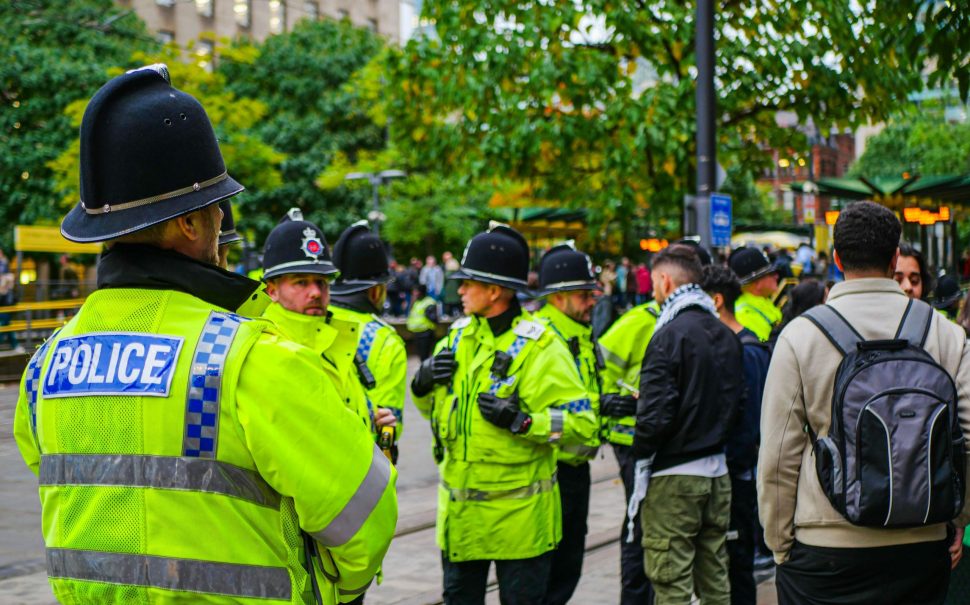Allegations against Greater Manchester Police more than doubled last year – the highest increase across all forces.
Police complaints, which are defined as expressions of dissatisfaction by a member of the public about the service they have received from a police force, involve one or more allegations.
A report by the Independent Office for Police Conduct (IOPC) has shown that Greater Manchester Police (GMP) had 9,738 allegations made against them in 2023/24, up from 4,634 in 2022/23.
This 110% spike ranked GMP third in England and Wales for most allegations per complaint last year. A total of 3,386 complaints were submitted, bringing the average number of allegations per case up to 2.88 – 62% more than the national average.
The things that were complained about the most were the same for all forces: police powers, policies and procedures, individual behaviour, and delivery of duties and services.
But the 177% year-on-year rise GMP saw in allegations about their officers’ behaviour was unlike any of the other forces’.
The increase – which went from 590 allegations in 2022/23 to 1,638 in 2023/24 – does not surprise Remi Joseph-Salisbury of the Northern Police Monitoring Project (NPMP), a grassroots organisation aimed at addressing police misconduct.
He said: “These figures reflect what communities have long known – Greater Manchester Police is failing the people it claims to serve. The sharp rise in complaints about officers’ behaviour points to a deeply embedded culture of disrespect, discrimination and abuse.
“Damning as they are, these numbers only scratch the surface – many don’t complain because they don’t trust a system that asks them to report the police to the police, or to the toothless IOPC.”
All complaints are initially dealt with by the Professional Standards Department within the police force involved, whose responsibility it is to log allegations against one of 11 categories.
Legislation allows for certain types of complaints to be handled informally outside of Schedule 3, the formal complaint process set out in the Police Reform Act 2002, when this is suitable and agreed upon with the complainant.
Available outcomes include apologies, explanations and organisational learnings. Just over half of GMP’s complaint cases (51%) were resolved this way in 2023/24, up from 45% in 2022/23.
If, however, a complainant is dissatisfied with the initial handling of their complaint, they can ask for it to be recorded under Schedule 3. Some complaints, such as those that involve death or serious injury or allegations that might result in criminal or disciplinary proceedings, will automatically be recorded.
Last year, 258 complaints – 42% more than in 2022/23 – were recorded under Schedule 3 because the complainant wasn’t satisfied with the outcome of the initial handling, and 331 complaints were subsequently referred to either the local policing body (GMCA) or the IOPC for review.
“We must recognise that this is not just about individual officers — the problems are institutional,” Joseph-Salisbury said.
“Breaking our reliance on policing to solve social problems means shifting funding away from police forces and into care, housing, and community support. Greater Manchester’s Police, Fire and Crime Panel should reflect on this next time they vote to raise taxes to fund policing – especially when it goes against the will of local people.”
‘People should have been sacked from the beginning’
Dubbed a “serial complainer” by GMP, Stephen Taylor, 50, from Middleton, is unwantedly very familiar with the police complaint process.
He raised his first complaint in 2021 following a poor investigation into an incident that saw him assaulted and threatened in his own home by a man he didn’t know.
GMP admitted that the investigation was not to the correct standard in that it lacked house-to-house enquiries and CCTV, which they acknowledged undermined Taylor’s credibility.
The alleged offender was never charged, but according to the force this was not due to poor policework.
The episode had such a negative impact on Taylor that GMP six months later made a referral to his GP for a mental health assessment. In it they added information about his behaviour as well as a list of crimes dating back to 1995, including theft of a motor vehicle, assault and racially aggravated damage.
This was standard practice – if the crimes had actually been committed by Taylor.
“The crimes they accused me of were never on the Police National Computer (PNC). They were added to discredit me,” he said.
“Conveniently, GMP has now deleted the ‘crimes’ and can no longer check why they were there in the first place.
“I did not commit those crimes.”

Taylor filed a new complaint with allegations of discreditable conduct, disclosure of information and abuse of position.
He believed the officers were protecting the alleged offender – a suspicion that only grew after a night out in Manchester last year.
Taylor, who had run into the alleged offender, was chased out of a pub and threatened by him and his acquaintances. GMP decided to take no further action, but failed to notify Taylor about this due to a “human error”.
“They’re running a ‘delay and frustrate tactic’,” Taylor said, adding: “People should have been sacked from the beginning.
“I have been made false promise after false promise. GMP aren’t sorry for what they have done, with no officer disciplined or held to account for any of what they put me through.
“I have been left with no confidence in what GMP stand for. Had it not been for certain individuals within the GMCA, GMP would have brushed it under the carpet.”
Since the incident in 2021, an officer has been put under performance review, and Taylor has been given £5,000 from GMP as a gesture of goodwill.
The police admitted that he had been treated “appallingly” by the force for far too long, but denied that any corruption or cover-up had taken place.
The complaint case is now closed, but Taylor is still waiting for the police to confirm to his GP that the crimes on his referral were incorrect.
An improved process
GMP didn’t comment on Taylor’s story, but said the rise in allegations was due to new police complaint reforms, introduced by the government in 2020 to simplify the complaint process.
GMP said: “We are now recording allegations with specificity, reviewing each claim individually, as opposed to our previous method of grouping allegations per complaint.
“This revised approach is considered best practice by the National Police Chiefs’ Council (NPCC) and is a positive move for the public. It provides reassurance that all allegations are being recorded to show a true and accurate reflection of the dissatisfaction being experienced by the public.
“We take all public complaints seriously and strive to resolve matters in a reasonable proportionate way while recognising we may not be able to satisfy every complainant.”
The IOPC did not respond to a request for comment.
Feature image credit: Dylan4photography on Unsplash




